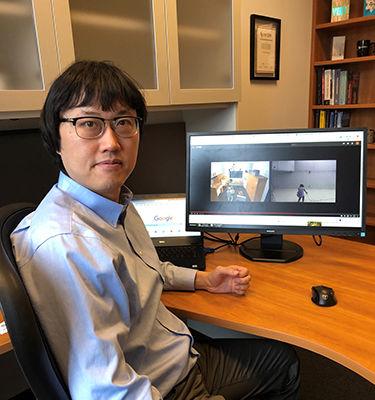
Craig Yu, an assistant professor of computer science, is researching ways to use artificial intelligence to develop software that will generate virtual reality training programs automatically and adapt those programs to help users master skills.
Virtual reality (VR) programs, used to teach safety lessons that could save lives, are costly and complicated to produce, but a Mason Engineering researcher’s work could make them more accessible.
Craig Yu, an assistant professor in the Department of Computer Science, is developing a computational design framework that companies can use to develop customized VR programs for headsets more easily and efficiently, which would lower costs.
The programs could be used for safety training in a variety of workplaces, including restaurants, factories, and construction sites.
Yu recently received a prestigious CAREER Award, which recognizes early-career researchers, from the National Science Foundation, for his research proposal, “Performance-Guided Synthesis of Virtual Environments for Personalized Training.”
“We are researching ways to use artificial intelligence to develop software that will generate training programs automatically and adapt those programs to help users master skills,” Yu says. “This will relieve the current bottleneck in VR content creation.”
Eventually, the open-access software could improve safety for many employees and lower the time and cost of training the workforce, he says. It will be able to track users during the training sessions and adapt the lessons if they need extra help mastering a skill.
For example, restaurant owners could create customized VR headset programs to train new employees about safety hazards in the kitchen. A new employee’s performance could be tracked.
If the trainee doesn’t do one portion of the task properly, the software will generate scenarios to help that person improve his or her skills. “That’s the innovation of this technology,” Yu says.
Huzefa Rangwala, professor and chair of the Department of Computer Science, says, “Craig's research on virtual reality is groundbreaking. He is one of the new leaders in the field, and his passion for making this technology available to everyone is exciting for everyone at the university, especially our students.”
As part of the award, Yu will set up a VR station at The MIX on the Fairfax Campus so students can use a virtual reality system. “We want people from other departments and non-engineering fields to explore how they can use VR for their domains,” he says.
He also plans to mentor first-generation college students with no research experience.
“I’m a first-generation undergraduate student. I met excellent mentors in my university days, and they ignited my passion to do research and explore academics,” he says.
“Now I want to do the same for others.”
